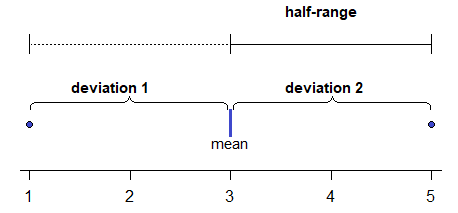They aren't equal in general, as Gomunkul points out; in the two observation case they are; that's the situation your book is referring to.
Since you already have a proof, my best guess is that you're mostly seeking intuition. I can offer a somewhat more intuitive explanation of why this is the case for two values. During the explanation, it helps to think of a concrete example -- let's say the values are 1 and 5.
With two values, the mean is the midpoint of the two values. Both values are equidistant from the mean. (3 is the mean, both values are 2 away from that.)
range is twice the distance of the midpoint to either of the observations. (The range is 5-1=4, and the distance of the ends to the midpoint is half of that -- i.e. 2.)
since both points are equally far from the mean, the mean deviation is that distance of either point from the mean (i.e. half the range). With two points the distance to half-way is always half the distance to the other end. (When both points are 2 away from the middle, the mean deviation is 2, which must be half the range)
with standard deviation*, $s_n$, first look at the variance, $s_n^2$. The variance is the average of the squared distances from the mean. Note that each point is the mean deviation away (half the range) from the mean, so when you square those you get both points contribute $\text{MD}^2$.
The average of two $\text{MD}^2$ values is also $\text{MD}^2$; so $\text{Var}=\text{MD}^2$. When you take the square root to get back to the standard deviation, you will get the mean deviation. ($(5-3)^2 = 2^2, (1-3)^2=2^2$, both of which are just the square of the distance from the middle to the ends (i.e. the square of MD); the average of $2^2$ and $2^2$ is $2^2$, still the square of the mean deviation)
- None of this argument depends on the particular values chosen for the example.
* this is the $n$-denominator standard deviation, not the Bessel-corrected version.

